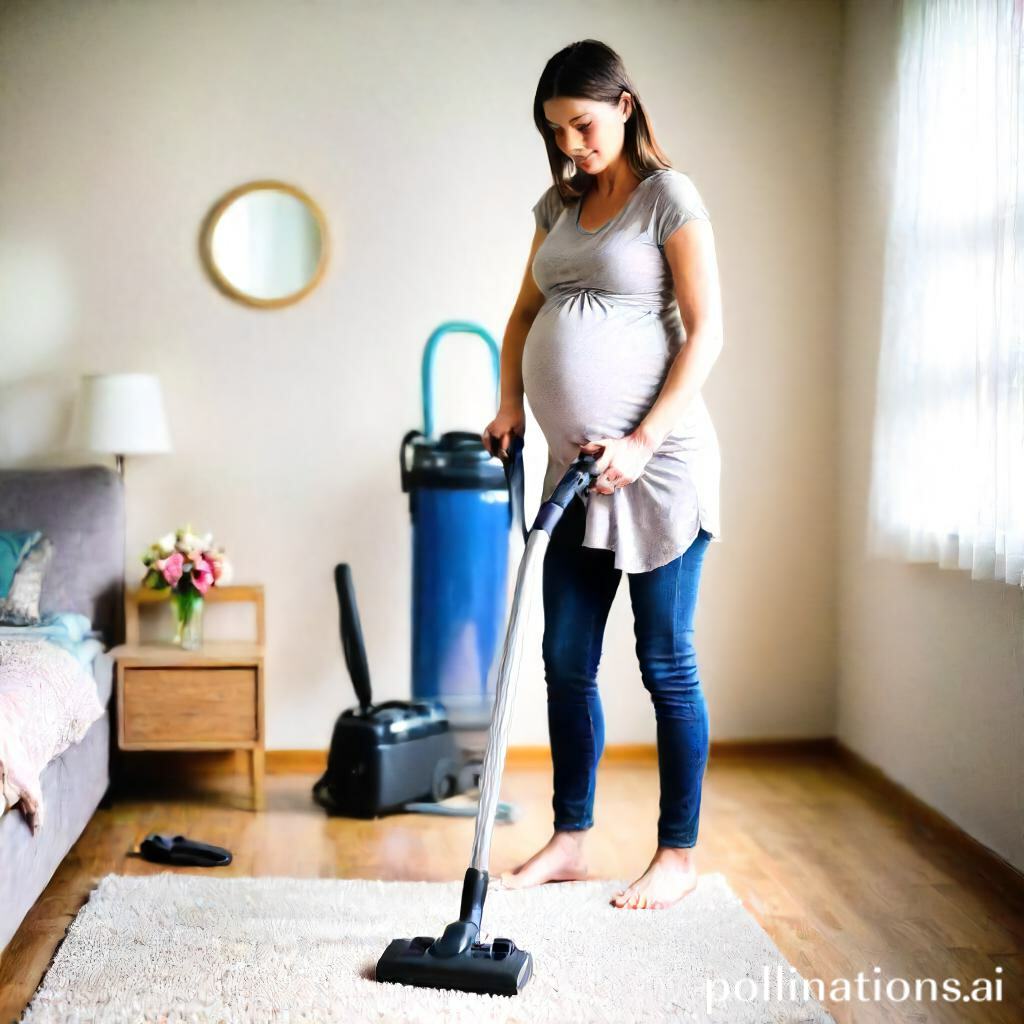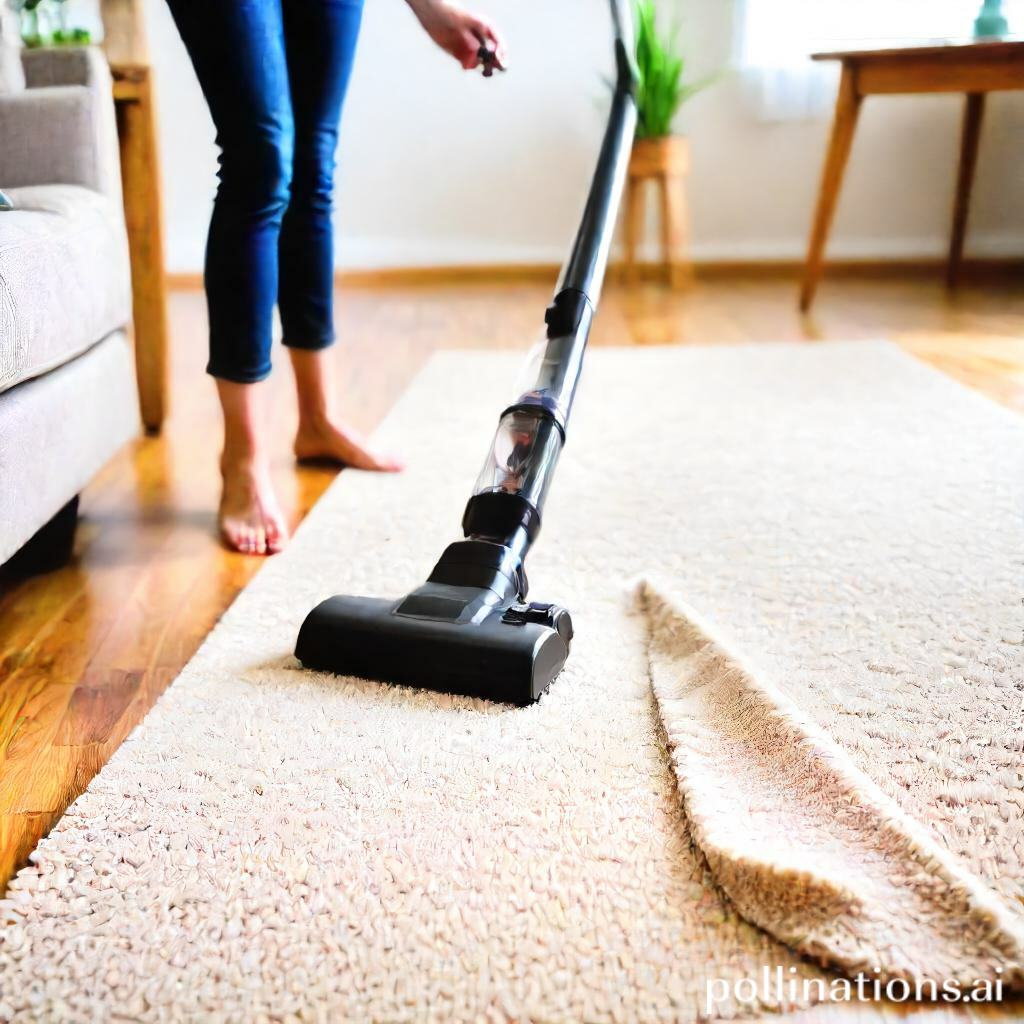Wondering if it’s safe to vacuum while you’re in the early stages of pregnancy? We understand that maintaining a clean home is crucial, but your safety and the well-being of your baby should always come first. In this blog post, we’ll delve into the potential risks associated with vacuuming and offer practical tips and alternatives to ensure a safe cleaning routine.
Learn how you can maintain a pristine home without jeopardizing your health or your baby’s development.
Understanding the Risks of Vacuuming During Early Pregnancy
A. Physical Strain and Fatigue During Cleaning
Regular household cleaning tasks, including vacuuming, can put a strain on the body during early pregnancy. The physical demands of repetitive motions and bending can cause discomfort and lead to fatigue. It is important to take necessary precautions to avoid excessive strain and conserve energy.
B. Exposure to Chemicals and Allergens
When vacuuming during early pregnancy, there is a potential risk of exposure to harmful chemicals and allergens commonly found in cleaning products. Some of these chemicals may pose risks to the developing fetus if inhaled or absorbed through the skin. To minimize these risks, it is advisable to choose non-toxic and eco-friendly cleaning products or use natural alternatives like vinegar or baking soda.
C. Impact of Increased Body Temperature
Engaging in cleaning activities, including vacuuming, can cause an increase in body temperature. Elevated body temperature, especially during the first trimester, has been associated with an increased risk of certain birth defects. Prolonged exposure to high temperatures from vigorous cleaning activities can potentially lead to overheating.
It is important to evaluate your individual circumstances and consult with your healthcare provider when considering vacuuming during early pregnancy. They can provide personalized guidance based on your specific health condition and the nature of the cleaning tasks involved. By taking necessary precautions and being aware of the potential risks, you can ensure a safe and healthy environment for both you and your developing baby.
Minimize strain and fatigue. Choose non-toxic cleaning products. Be cautious of body temperature. Consult healthcare provider for personalized guidance.
Is Vacuuming Safe During Early Pregnancy?
Precautions to Take
| A. Limiting physical exertion |
|---|
|
| B. Using non-toxic cleaning products |
|
| C. Ensuring proper ventilation |
|
| D. Wearing protective gear |
|
Alternatives to Vacuuming
Using a Broom or Mop
- Benefits of manual cleaning methods: Manual cleaning methods, like using a broom or mop, are a safe alternative to vacuuming during early pregnancy. They eliminate potential risks associated with vacuum cleaners, such as exposure to dust, allergens, and chemicals in vacuum bags or filters.
- Choosing the right tools for effective cleaning: When opting for manual cleaning, it’s important to select the appropriate tools. A broom with soft bristles and a mop with a microfiber or washable pad can efficiently remove dirt and dust without stirring up particles into the air.
Seeking Help from Family or Friends
- Importance of support during pregnancy: Pregnancy is a time when expectant mothers should prioritize their health and well-being. Seeking assistance from family or friends with household chores, including cleaning, can reduce physical strain and minimize potential risks associated with these activities.
- Sharing household chores for a safer environment: Involving family or friends in household chores allows pregnant women to create a safer environment for themselves and their unborn child. Distributing the workload ensures that no single individual is exposed to excessive cleaning tasks, reducing overall risk.
Hiring Professional Cleaning Services
- Ensuring thorough and safe cleaning: Hiring professional cleaning services offers a reliable and efficient solution for maintaining a clean home during pregnancy. Professional cleaners are trained to use safe techniques and non-toxic products that are less likely to harm the pregnant woman or her baby.
- Researching reputable cleaning companies: When considering professional cleaning services, it’s essential to research and choose reputable companies. Look for those that prioritize eco-friendly and non-toxic cleaning products, and have positive reviews and recommendations from other customers.
By exploring alternatives to vacuuming, like using a broom or mop, seeking help from family or friends, or hiring professional cleaning services, pregnant women can maintain a clean and safe environment without unnecessary risks. Prioritizing safety and well-being during pregnancy is crucial, and these alternatives provide viable options for effective cleaning.

Tips for Safe Vacuuming During Early Pregnancy
Taking frequent breaks
- Preventing overexertion during cleaning: Vacuuming can be physically demanding, so it is important to take regular breaks to avoid overexertion. This can help prevent fatigue and reduce the risk of injury.
- Allowing time for rest and relaxation: Pregnancy is a time when rest and relaxation are crucial. Taking breaks during vacuuming allows you to rest and recharge, ensuring the well-being of both you and your baby.
Using lightweight and maneuverable vacuum cleaners
- Easier handling and reduced strain: Opt for lightweight vacuum cleaners that are easy to maneuver. This reduces the strain on your body, especially your back and abdominal muscles, minimizing the risk of discomfort or injury.
- Choosing the right vacuum for your needs: Consider factors such as weight, size, and maneuverability when selecting a vacuum cleaner. Look for models that are specifically designed for easy handling and are suitable for your specific cleaning requirements.
Avoiding heavy lifting
- Potential risks to the body and pregnancy: Lifting heavy objects while vacuuming can put unnecessary strain on your body, particularly your back and abdominal muscles. This strain can potentially lead to injuries or complications during pregnancy.
- Asking for assistance with heavy objects: When faced with heavy objects that need to be moved, it is important to ask for help. Request assistance from a family member or a friend to ensure your safety and the well-being of your baby.
Using proper posture and body mechanics
- Maintaining good posture while vacuuming: It is essential to maintain proper posture while vacuuming to minimize strain on your body. Stand up straight, engage your core muscles, and avoid hunching over the vacuum cleaner.
- Protecting the back and preventing injuries: Lift the vacuum cleaner using your leg muscles instead of your back. Bend your knees and keep your back straight when picking up or moving the vacuum cleaner to prevent back injuries.
– Take frequent breaks to prevent overexertion
– Use lightweight and maneuverable vacuum cleaners
– Avoid heavy lifting and ask for assistance
– Maintain proper posture and use your leg muscles when lifting
Seeking Medical Advice for Vacuuming During Early Pregnancy
Consulting with your healthcare provider
- Importance of regular prenatal check-ups
- Ensuring the well-being of both the mother and the baby
- Monitoring the progress of the pregnancy
Discussing any concerns or symptoms experienced
- Open communication with your healthcare provider
- Building a trusting relationship with your doctor
- Reporting any unusual symptoms or discomfort
- Addressing specific concerns related to vacuuming
During early pregnancy, it is essential to consult with your healthcare provider regarding various aspects of your daily routine, including cleaning activities like vacuuming. Regular prenatal check-ups play a crucial role in ensuring the well-being of both the mother and the baby. These check-ups allow healthcare providers to monitor the progress of the pregnancy and address any concerns that may arise.
When discussing cleaning concerns with your doctor, it is important to have open communication. This means sharing any concerns or symptoms you may be experiencing. By building a trusting relationship with your healthcare provider, you can feel comfortable discussing even the smallest discomfort or unusual symptoms.
When it comes to vacuuming during early pregnancy, it is important to report any unusual symptoms or discomfort you may experience while performing this task. Your healthcare provider can provide personalized advice and guidance based on your specific situation. By addressing any concerns related to vacuuming, you can ensure a safe and healthy pregnancy journey.
Remember, every pregnancy is unique, and seeking medical advice is crucial to ensure the well-being of both you and your baby.
Conclusion
Prioritizing safety during early pregnancy is crucial for cleaning activities like vacuuming. The physical strain, chemical exposure, and risks of overheating can be harmful to both the mother and the developing fetus. To minimize these risks, pregnant individuals should limit physical exertion, use non-toxic cleaning products, ensure proper ventilation, and wear protective gear.
Exploring alternatives to vacuuming, such as using a broom or mop, seeking help from others, or hiring professional cleaning services, can create a safer environment. It is important to consult with a healthcare provider about any concerns or symptoms experienced during cleaning activities. By following these guidelines, individuals can maintain a safe and healthy environment for themselves and their unborn child.
Faq about Vacuuming During Early Pregnancy
FAQ 1: Is it safe to vacuum during early pregnancy?
Yes, vacuuming is generally safe during early pregnancy. Take necessary precautions and avoid overexertion. Consult with your healthcare provider if you have concerns or complications.
FAQ 2: What cleaning products should I avoid using?
Avoid using harsh chemicals and cleaning products with strong fumes during pregnancy. Opt for natural or eco-friendly alternatives, as they are safer for you and your baby.
FAQ 3: Can vacuuming cause miscarriage?
There is no evidence to suggest that vacuuming can cause miscarriage. Consult with your healthcare provider for personalized advice if you have a high-risk pregnancy or complications.
FAQ 4: How often should I take breaks while vacuuming?
Take breaks as needed while vacuuming. This helps prevent overexertion and reduces fatigue. Aim for short breaks every 15-20 minutes or when you feel tired.
FAQ 5: Is it safe to use a robotic vacuum cleaner during pregnancy?
Using a robotic vacuum cleaner is generally safe during pregnancy. Ensure proper ventilation and avoid inhaling dust or debris. Consult with your healthcare provider if you have concerns.
Remember, every pregnancy is unique, so consult with your healthcare provider for specific guidance and recommendations.

